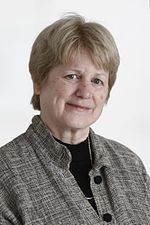Mary-Claire King, Date of Birth, Place of Birth
TweetMary-Claire King
American geneticist
 Date of Birth: 27-Feb-1946
Date of Birth: 27-Feb-1946
 Place of Birth: Wilmette, Illinois, United States
Place of Birth: Wilmette, Illinois, United States
Profession: biologist, human rights activist, university teacher, geneticist
Nationality: United States
Zodiac Sign: Pisces 
About Mary-Claire King
- Mary-Claire King (born February 27, 1946) is the American Cancer Society Professor of Genome Sciences and of Medical Genetics in the Department of Medicine at the University of Washington.
- She studies human genetics and is particularly interested in genetic heterogeneity and complex traits.
- She studies the interaction of genetics and environmental influences and their effects on human conditions such as breast and ovarian cancer, inherited deafness, schizophrenia, HIV, systemic lupus erythematosus and rheumatoid arthritis.King is known for three major accomplishments: demonstrating that humans and chimpanzees are 99% genetically identical; identifying breast cancer genes; and applying genomic sequencing to identify victims of human rights abuses.
- In 1984, in Argentina, she began working with Abuelas de Plaza de Mayo (Grandmothers of Plaza de Mayo) in identifying children who had been stolen from their families and adopted illegally under the military dictatorship during the Dirty War (1976-1983).
- In 2002, Discover magazine recognized King as one of the 50 most important women in science.
Read more at Wikipedia
See Also
- Famous People's Birthdays on 27 February, United States
- Famous People's Birthdays in February, United States
- Famous biologist's Birthdays on 27 February, United States
- Famous biologist's Birthdays in February, United States
- Famous human rights activist's Birthdays on 27 February, United States
- Famous human rights activist's Birthdays in February, United States
- Famous university teacher's Birthdays on 27 February, United States
- Famous university teacher's Birthdays in February, United States
- Famous geneticist's Birthdays on 27 February, United States
- Famous geneticist's Birthdays in February, United States

